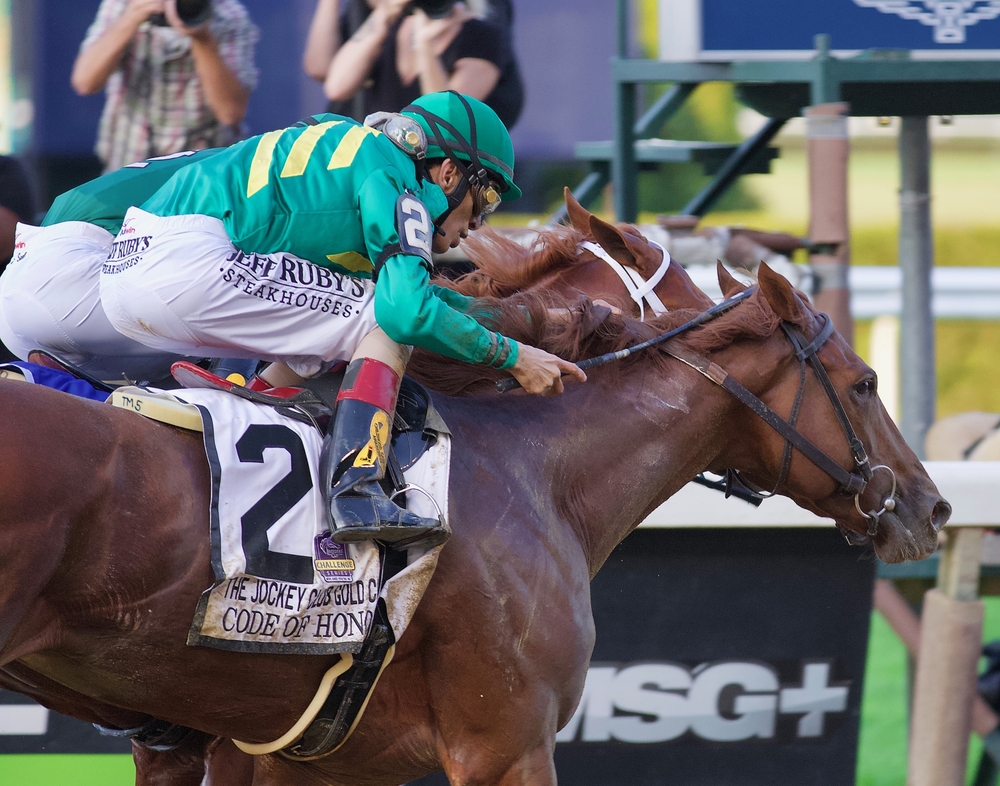Do bookies want the favourite to win? This is not a question that can be answered with a simple yes or no. The art of bookmaking isn’t as easy as simple as laying all the selections other than the market leader and then cheering the favourite home.
Equally, bookmaking is much more complex than laying all the favourites for as much as they can and then simply waiting for them to be beaten to get rich. So in some cases, bookies want the favourite to win and in other cases, they do not.
How Bookies Price a Market
Bookmakers tend to have a policy when compiling a book or a horse race or other sporting event, which is building as much of a percentage of themselves in that book as they possibly can. To understand this, you need to understand what a 100% book is:
If all 10 runners in a 10-horse race are priced up at 9/1, this would be betting to 100%. That’s because, if all selections were backed to equal money, the bookies would pay out all the money they had taken on the race regardless of which of the 10 horses won. If £100 was bet on each of the 10 horses, the bookies would have £1,000 in his satchel. No matter which horse wins, they would settle that bet at £100 x 9/1 = £900 + £100 stake returned = £1,000.
That’s why bookies make a book where the odds are in their favour. By pricing up all 10 runners at 8/1, the bookies would then only have to pay out £800 + £100 stake = £900… guaranteeing a profit of £100 or 10%.
But bookmaking is still much harder than this, as not all horses are backed to lose the same amount. Heavily backed horses will also be cut by bookmakers whilst some odds will be pushed out to encourage punters to back them.
Because of these potential market fluctuations, bookies will try to build an even bigger percentage for themselves when compiling a book. Using our 10-horse race as an example again, bookies may well price up all horses at 7/1 to start with to allow them to cut and push out odds according to demand and supply.
An Example Market
Below is an example market for a 4-runner race taken from Bet365. You can see there is a clear favourite in Armory and a clear second favourite with Sangarius.

In the above 4-runner race, Bet365 have priced the horses up at 11/10, 9/2, 12/1 and 9/4. At the time of publishing, OddsChecker show 42% of bets being placed on Armory, 28% of bets are on Palavecino, 19% are for Sangarius and the remaining 11% is for Bangkok.
Let’s assume £100,000 of bets are placed on this race, that would equate to £42,000 for Armory, £28,000 for Palavecino, £14,000 for Sangarius and £10,000 for Bangkok.
IF Armory, the favourite, wins then Bet365 make a profit of £11,800.
IF Sangarius, the second favourite, wins then Bet365 make a profit of £38,250.
If Bangkok wins then Bet365 make a profit of £39,500
If Palavecino wins then Bet365 make a LOSS of £264,000
In this particular market, Bet365 would be quite happy for the second or third favourite to win. The favourite would produce a decent profit for them. Bet365 will NOT want the main underdog to win.
Do the Bookies Always Win?
Although bookies may lose on some markets, they will price up the markets to ensure they always win in the longer term. You rarely see any of the major bookies going out of business, do you?
However, that doesn’t mean that the bookies will beat every individual punter. There are punters who are able to find an edge and beat the bookies in the longer term. Bookies are not interested in beating the individual punter but are looking to beat punters as a collective group.
Why Do Bookies Offer Different Odds?
Bookmaking is a competitive industry and bookmakers are all trying to get a bigger share of the betting industry’s multi-million-pound turnover. In an ideal world, bookmakers would compile books on races that would allow them to make a profit no matter which horse won. But that’s not as easy as it sounds.
The fact other bookmakers offer better odds on some selections means those bookmakers will take the most money on those horses. They must also compete with betting exchanges where punters are free to offer odds to other punters. That’s why many modern bookmakers must take more of a chance on some races than they’d like to.
Modern bookmakers often must stick their neck on the line more than they used to, taking a strong opinion on a race and watching their satchel swell or empty on the back of their judgement.
This is especially true of on-course bookmakers, as racecourse crowds can often vary wildly at different racecourses. Crowds at the likes of the Cheltenham Festival and Royal Ascot will often be made up of real racing buffs, ones that will part with place big bets on favourites that have proved themselves at the top level.
In this instance, bookmakers may have to lay the favourites heavily, which means they won’t want the favourites to win. Meanwhile, smaller meetings at seaside courses such as Brighton, Yarmouth, and Cartmel are more likely to be filled with holidaymakers that may be attracted by selections at bigger odds. That means bookies may struggle to lay short-priced favourites, so they can cheer them home and profit from them.
Should You Bet on the Favourite?
The art of backing favourites is backing them when they’re a bigger price than their actual chances of winning. That doesn’t matter if they’re 1/5 and they should be 1/6, 6/4 when they should be even-money, or 5/1 when they should be 4/1.
What Determines The Odds Of A Favourite?
There are lots of factors why a bookie may decide to take on a favourite. These include weather forecasts that suggest the ground conditions may change. The draw can also have a dramatic effect at some flat racing courses, as can the pace of the race. Bookmakers also consider trainer form, jockey bookings, and lots of other criteria.
If a bookie thinks that everything is in favour of the favourite and not his rivals, he’s much more likely to keep the favourite on side and cheer him home if he wins.
Of course, if a bookie is considering these things, so should you. If you don’t have the time to study the form-book as much as you’d like to, you may wish to consider using a proven profitable tipster who does. A good tipster knows when a favourite offers value or not.
How often does the bookies favourite win?
The frequency with which the bookies’ favourite wins varies across different sports and events. However, in many cases, the favourite to win is determined based on a combination of form, statistics, and public opinion, which often gives them a higher probability of winning compared to other competitors.
In horse racing, for instance, the bookies’ favourite typically has a win rate of around 30-35%. This means that, on average, the favourite horse wins about one in every three races. However, this percentage can fluctuate based on the quality of the field, track conditions, and other variables.
The question often arises: do bookies want the favourite to win? The answer is nuanced. While bookies set odds based on the likelihood of outcomes, they also factor in where the majority of the money is being placed. If too much money is placed on the favourite, and that horse or team wins, the bookies could face significant payouts. Conversely, if an underdog wins, it can be more profitable for them. Therefore, while bookies might not necessarily “want” the favourite to win, they do aim to balance the books to ensure they profit regardless of the outcome.
In conclusion, while the bookies’ favourite does have a statistically better chance of winning, it’s by no means a guarantee. Bettors should always conduct their research and not rely solely on betting on favourites.
Final Summary
When determining whether or not the bookies want the favourite to win, you need to look at the individual market and how the bookie has priced that market up. If they have put weight onto the favourite winning and put that edge into their pricing then they will want it to win.





